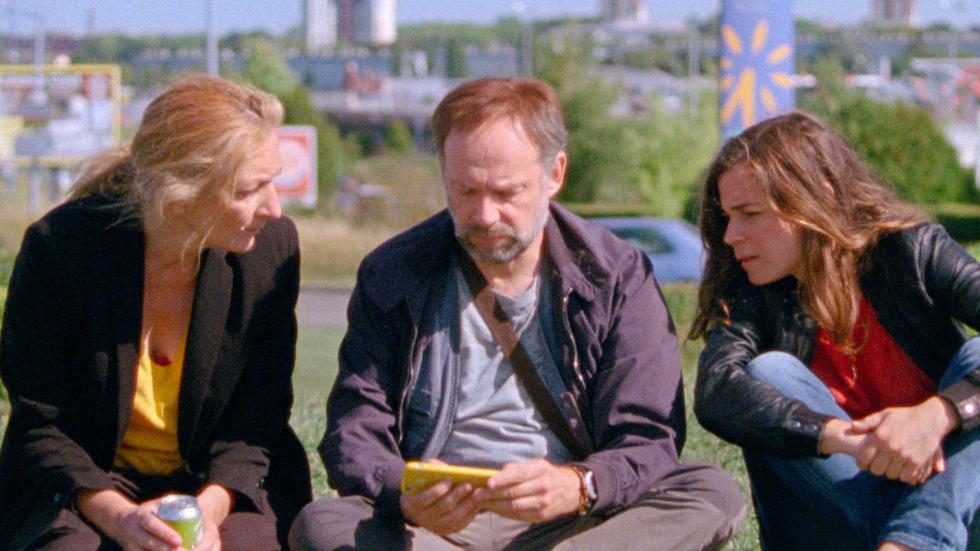Benoît Delépine and Gustave Kervern present Delete History, a satirical comedy about mobile and internet addiction, at the Seville European Film Festival
To celebrate the International Day of European Cinema, this film will be screened simultaneously in twenty Spanish cinemas
The Official Section of the Seville Festival hosts the Spanish premiere of Delete History, an eccentric comedy that satirizes cell phone addiction, social networks and online shopping through the story of three unhappy characters. The French filmmaker couple Benoît Delépine (Saint-Quentin, 1958) and Gustave Kervern (Mauritius, 1962) authored a film based on their own personal experiences. "Like administrative or bureaucratic problems, computer and Internet-related problems cause us all anxiety. It's something universal and concerns us all, we could see it in Germany, where the public identified a lot with the story," said Kervern, referring to her time at the Berlinale, where they got a Special Silver Bear Award from the Jury.
The film ironically addresses how the omnipresence of technology in everyday life has changed interpersonal relationships. "It is a story of its time, companies like those that make up the so-called GAFA group [Google, Apple, Facebook and Amazon] are very important today. In a way, we are all controlled through our phones, and we contribute to being overpowered without being fully aware of it. Kervern has referred to other current problems such as the yellow vest movement, the climate crisis, "potential dictators" and, of course, the coronavirus. "These companies, and others like Uber, are the big winners in this context".
Delépine and Kervern, who are tackling their ninth feature film as co-directors after completing renowned titles such as Aaltra, Mammuth or Le grand soir, have stated that since their beginnings they have made practically the same film, and have pointed out Cervantes and Don Quixote as one of their great influences. "Our characters always fight against windmills, which in today's world are the GAFA companies", they have expressed. Likewise, they have declared themselves "very bad directors" and have assured that in all their films they start "from what the actors suggest, we like to give them freedom and we ask them to find their character. It is up to these actors, who are very talented, to find a way to bring them to life".
As for the presence of big stars in the titles that make up their career, such as Gérard Depardieu, Isabelle Adjani or Albert Dupontel, Kervern has said that they choose them "according to their personality, so we always have a clear idea of who they are going to be. But, unlike other directors, we don't rehearse or do readings of the script beforehand. We like freshness, for us a film is an adventure and we like to introduce changes; from one day to the next our scripts can vary a lot". They also referred to the funny cameo by Michel Houellebecq, a regular in their filmography: "We love what he writes and above all what he represents, that sphinx character: he talks little but with a lot of sense of humor. We like his diction, his way of looking, in fact he seems like an authentic film actor. He is someone who is exciting, both on and off the set".
Kervern also spoke about the type of humor they practice, which is very different from the most successful French comedy, from which they consider themselves to be on the sidelines. "There is a sociological side to our films about the absurdities of this world. Humor is innate, but the dark humor we like needs to be learned. It is based on experience and even death, so it involves learning. We believe that we must educate in humor, in respect for humor," he concluded in reference to the Charlie Hebdo cartoons.
INTERNATIONAL DAY OF EUROPEAN CINEMA
Erase the history has been the film chosen to commemorate the International Day of European Cinema, which this year reaches its fifth edition. Organized by the International Confederation of Arthouse Cinemas (CICAE) in collaboration with the network of cinemas specialized in programming European films Europa Cinemas, this initiative will allow the Seville Festival to screen this title simultaneously in twenty cinemas throughout Spain, including Madrid, Palma de Mallorca, Pamplona, Bilbao, Ferrol, Valencia, Malaga, San Sebastian, Cordoba, Cadiz, Zaragoza and Salamanca.
The International Day of European Cinema is a unique initiative, driven by film exhibitors to enhance the cinematic experience in theatres and promote the circulation of European auteur cinema. More than six hundred cinemas around the world are participating in the European Arthouse Cinema Day 2020, offering a special program with previews, meetings with filmmakers, children's films or cinema classics. The project has the support of the European Union's Creative Europe MEDIA program and the collaboration of the different sectors of the film industry.



